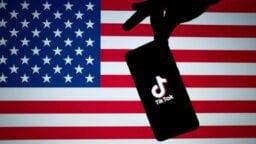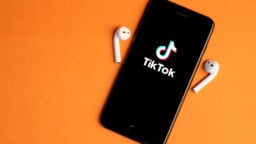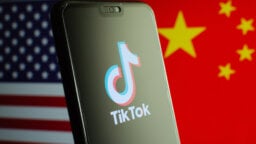What’s Happened?
TikTok and the US Justice Department faced off in federal court on Monday (September 16) to present their arguments over a law that could ban the social media platform in the United States.
During the hearing at the US Court of Appeals for the DC Circuit, both sides were given 25 minutes to present their arguments.
TikTok argued that the law, which requires its parent company ByteDance to divest its US assets by January 2025 or face a ban, violates the First Amendment’s guarantee of freedom of speech. The company’s attorney, Andrew Pincus, stressed that the law is a “radical departure” from the United States’ support for an open internet and would set a “dangerous precedent.”
“No compelling reason justifies Congress acting like an enforcement agency and specifically targeting petitioners,” Pincus was quoted by CBS News as saying.
Pincus added that the ban would restrict not only TikTok’s speech but also that of 170 million American users.
Meanwhile, the Justice Department, represented by attorney Daniel Tenny, defended the law, arguing that the ban is necessary to protect national security, claiming that the problem arises out of the data being “extremely valuable to a foreign adversary trying to compromise the security of the United States.”
The court hearing marks just the latest development in a series of legal challenges and regulatory actions against TikTok in the US. The app has navigated a complex regulatory landscape and faced intense scrutiny from government officials.
Here’s a complete rundown of everything that has happened so far in this legal battle:
March 23, 2023: TikTok CEO Shou Zi Chew appears before Congress
TikTok CEO Shou Zi Chew testified before the House Energy and Commerce Committee, addressing the company’s practices regarding consumer privacy, data security, its effect on children, and its ties to the Chinese Communist Party.
Aroudn the time of the hearing, US Secretary of State Antony Blinken said TikTok should be “ended one way or another,” while Washington Republican Rep. Cathy McMorris Rodgers, chair of the House Energy and Commerce Committee, told Shou: “Your platform should be banned.”
March 5, 2024: The ‘Protecting Americans from Foreign Adversary Controlled Applications Act’ was proposed
Rep. Mike Gallagher (R-Wis.) and Rep. Raja Krishnamoorthi (D-Ill.) introduced the bill, “Protecting Americans from Foreign Adversary Controlled Applications Act.”
If passed, the bill would ban ByteDance-owned apps, including TikTok, from US app stores like Apple’s App Store and Google Play, as well as web hosting services, unless such an app “severs ties to entities like ByteDance that are subject to the control of a foreign adversary.”
“This is my message to TikTok: break up with the Chinese Communist Party or lose access to your American users,” said Gallagher.
“America’s foremost adversary has no business controlling a dominant media platform in the United States. TikTok’s time in the United States is over unless it ends its relationship with CCP-controlled ByteDance.”
Krishnamoorthi added: “So long as it is owned by ByteDance and thus required to collaborate with the CCP, TikTok poses critical threats to our national security.”
March 7, 2024: Bill passes House Energy and Commerce Committee
The bill, also known as the TikTok divest-or-ban bill, passed the House Energy and Commerce committee in a 50-0 vote.
In response to the move, TikTok said: “This legislation has a predetermined outcome: a total ban of TikTok in the United States.
“The government is attempting to strip 170 million Americans of their Constitutional right to free expression. This will damage millions of businesses, deny artists an audience, and destroy the livelihoods of countless creators across the country.”
March 8, 2024: Biden says he will support the bill
US President Joe Biden has given the bill his support. “If they pass it, I’ll sign it,” President Biden told reporters, according to CBS News.
House Majority Leader Steve Scalise, a Louisiana Republican, said: “I will bring this critical national security bill to the House floor for a vote next week.”
However, Sen. Maria Cantwell, the Democrat from the state of Washington who heads up the Senate Commerce Committee, has not committed to introducing such a bill, with no companion bill presented in the US Senate at the time. “I will be talking to my Senate and House colleagues to try to find a path forward that is constitutional and protects civil liberties,” Cantwell said in a statement to CNN.
March 13, 2024: US Congress passes standalone version of the bill
Lawmakers in the US House of Representatives passed a standalone version of the legislation in a 352-65 vote. The bill’s momentum was initially expected to slow, as no companion bill has yet been introduced in the Senate.
“This process was secret and the bill was jammed through for one reason: it’s a ban,” TikTok said in a statement on X shortly after the vote.
The bill’s sponsors have repeatedly insisted that it’s not a ban, as ByteDance has the option of selling the platform’s US operations, and the bill is meant to address national security concerns surrounding TikTok, as they argue that ByteDance is legally required to share data with the Chinese government upon request.
April 20, 2024: Bill passes the House of Representatives
To expedite its passage, the bill was included in a larger $95 billion foreign and military aid package — for Israel, Taiwan and Ukraine — that passed the House.
“Companies and bad actors are collecting troves of our data unchecked and using it to exploit, monetize, and manipulate Americans of all ages,” Rodgers and House Energy and Commerce Committee Ranking Member Frank Pallone, Jr. said.
April 20, 2024: TikTok denies removing US general counsel
Bloomberg News reported that TikTok had planned to remove Erich Andersen, its general counsel, from his role leading negotiations with the US government. However, TikTok spokesperson Alex Haurek said: “That is 100% false,” when questioned by Bloomberg.
April 23, 2024: Bill sails through Senate
The US Senate passed the bill with a 79-18 vote. The revised Senate version gives ByteDance more time to sell TikTok (270 days, compared to 165 days in the original version of the bill) plus a possible three-month extension if a sale is actively underway.
The legislation also restricts ByteDance’s control over TikTok’s core algorithm, the powerful tool that tailors content based on user preferences and has been a key factor in the platform’s success.
April 23, 2024: Biden signs bill into law
US President Joe Biden signed the bill into law, requiring ByteDance to divest its holdings in TikTok, or face an effective ban of the app in the US.
“The path to my desk was a difficult path. It should have been easier and it should’ve gotten there sooner,” Biden said after signing the bill, as quoted by CNBC.
The signing of the bill into law meant that ByteDance has until January 19, 2025, to sell TikTok, as the law gives the company 270 days to find a buyer.
However, the president has the option to extend the deadline by 90 days if there is evidence that a sale process is underway.
April 24, 2024: TikTok says it will fight the law
In response, TikTok CEO Shou Zi Chew said TikTok would fight the “unconstitutional” law in the courts, and “while we make our case in court, you’ll still be able to enjoy TikTok like you always have.”
“Rest assured, we aren’t going anywhere.”
April 27, 2024: TikTok’s General Counsel takes on new role as special counsel
A week after TikTok denied removing Erich Andersen, General Counsel for TikTok and its parent company ByteDance, Andersen announced that he will step down from his role in June to take on the role of special counsel to the company.
In his new role, Andersen will “focus on helping to drive the company’s effort to overturn the unconstitutional ban legislation in the US and other pressing legal matters.”
May 7, 2024: TikTok sues US government
TikTok and ByteDance sued the US government over the law, calling it “unconstitutional” in a complaint filed with the US Court of Appeals for the District of Columbia.
The lawsuit gives three reasons why selling TikTok’s US operations isn’t feasible: First, US users and content would be separated from TikTok’s global network. Second, the law would require transferring TikTok’s source code to the buyer and blocking any “operational relationship” between ByteDance and the new US platform. Lastly, the complaint states that the Chinese government will not allow it.
“The Chinese government has made clear that it would not permit a divestment of the recommendation engine that is a key to the success of TikTok in the United States.”
May 14, 2024: Eight TikTok content creators sue US government
Eight TikTok content creators sued the government, arguing that the new law violates their First Amendment rights to free speech.
The lawsuit claimed that the creators “rely on TikTok to express themselves, learn, advocate for causes, share opinions, create communities, and even make a living.”
May 28, 2024: US Appeals Court sets accelerated schedule to hear TikTok’s challenge
The Appeals Court in Washington, D.C., has set an accelerated schedule to hear arguments over the new law in September. According to a report from Reuters, TikTok said the expedited pace of hearings means it may not have to file for an injunction to prevent the law from being enforced.
June 18, 2024: FTC refers TikTok complaint to DOJ
In a separate development, the US Federal Trade Commission (FTC) voted 3-0-2 to refer a formal complaint against TikTok and ByteDance to the Department of Justice.
The probe stems from a 2019 settlement with Musical.ly, a video-sharing app acquired by TikTok in late 2017. Musical.ly faced penalties for violating the Children’s Online Privacy Protection Act (COPPA), a law that requires parental consent before collecting personal information from children under 13.
July 26, 2024: DOJ responds to TikTok’s lawsuit
The DOJ submitted a response to the US Court of Appeals, defending the divest-or-ban law. The DOJ raised concerns about the app’s potential to be used by the Chinese government to collect sensitive data on Americans and spread propaganda.
“Given TikTok’s broad reach within the United States, the capacity for China to use TikTok’s features to achieve its overarching objective to undermine American interests creates a national-security threat of immense depth and scale,” the DOJ said in its filing as reported by the New York Times.
July 26, 2024: TikTok issues a statement
In response to the DOJ’s filing with the Appeals Court, TikTok issued a statement, saying, “Nothing in this brief changes the fact that the Constitution is on our side.”
TikTok reiterated that the government has not provided evidence to support its claims, including when Congress enacted the law in question. The statement continued: “The government is taking this unprecedented step while hiding behind secret information. We remain confident we will prevail in court.”
August 2, 2024: DOJ files child privacy lawsuit against TikTok
Separately, the DOJ, in conjunction with the FTC, filed a lawsuit against TikTok for allegedly violating children’s privacy laws. The lawsuit filed in the US District Court for the Central District of California alleges that TikTok has been collecting personal information without obtaining parental consent. The department said this violates the COPPA.
What are the implications of a TikTok ban or sale?
The legal showdown between TikTok and the US could have far-reaching implications both in the US and overseas. Professor Vili Lehdonvirta and researcher Sara Parker of the Oxford Internet Institute in the University of Oxford said a TikTok ban would have a “huge short-term impact” on content creators and small businesses who rely on the app.
“TikTok is an especially important channel for small businesses catering to fast-moving trends, partly through TikTok Shop, the platform’s e-commerce platform. Last year, Shop generated $1.1bn in gross merchandise revenue (GMR) in the US. This is less than one percent of Amazon’s GMR, but it has been growing fast,” they said.
The removal of TikTok from the US market could create an opportunity for other social media platforms like YouTube Shorts or Instagram Reels.
Additionally, a decision upholding the divest-or-ban law could set a precedent for free speech and government intervention. “The ban sets a dangerous precedent for the government telling us how and with who we can communicate,” Talia Cadet, one of the TikTok creators who filed a complaint against the new law, told reporters after the hearing on Monday.
“I can’t stand for that, which is why I’m a part of this lawsuit,” Cadet was quoted by the New York Times as saying.
What Happens Next?
The court is expected to make a decision on the divest-or-ban law in December. If either side disagrees with the ruling, they can appeal to a higher court before the January 19 deadline for the ban. If that happens, the case might end up in the Supreme Court.
Music Business Worldwide





